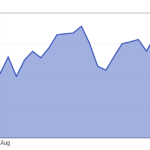America’s Fiscal Storm Clouds Grow Closer, But Few Care
It was announced yesterday that the trust funds for both Social Security and Medicare (health insurance for those 65 and older and those 65 and younger with certain disabilities) are facing shortfalls that will affect benefits for future beneficiaries.
This is not new news, however. These shortfalls have been known for quite some time now.
The difference with yesterday’s release of the Annual Reports for Social Security and Medicare is that Medicare’s Hospital Insurance Trust Fund’s depletion date was moved up to the year 2026, three years earlier than last year’s report.
The trust fund depletion date for Social Security remained the same, 2034.
The good news: depletion of either trust fund does not mean benefits will disappear entirely.
The bad news: without significant intervention by our elected officials at the federal level, there will be cuts to benefits – or significant increases in taxes – when those depletion dates hit.
Social Security
For Social Security, it’s estimated (without changes to the current program) checks will be reduced by 20%-25% in 2034.
For most retirees, that will be a mighty financial wallop to stomach. Especially considering the limited retirement savings many Americans currently have.
Medicare
Medicare, for anyone at all familiar, is about a convoluted as a program can get. Still, it serves an invaluable service to America’s aging population, providing health care services for (relatively) little out of pocket costs for enrolled individuals.
Which is a large part of the Medicare funding problem.
The portion of the U.S. population participating in Medicare is growing and will continue to grow, as a result of the Baby Boomer generation hitting age 65+.
Advances in healthcare have helped to increase longevity, which, itself, is another weight Medicare is having to bear.
Add the fact that health care costs have continued to increase at levels far beyond what many deem appropriate, and you have the recipe for an unsustainable government program.
Without reform of the current Medicare program, costs to balance its shortfall would be significant.
- Payroll taxes specific to Medicare (hospitals) would need to increase from 1.45 percent to 1.64 percent
- Annual Premiums for Medicare Part B (physicians) would increase from $1,608 to $6,191
- Annual Premiums for Medicare Part D (drugs) would increase from $432 to $2,786
These numbers are courtesy of the American Action Forum’s research paper “The Future of America’s Entitlements: What You Need to Know About the Medicare and Social Security Trustees Reports,” and are based on current conditions.
Without legislative changes, it is doubtful these numbers would improve. More likely, we’d see even more medical costs borne by individuals.
It Doesn’t Have to Be This Way
As I mentioned earlier, those who pay attention have been aware of these funding shortfalls for many years now.
In fact, in 2010, then-President Obama created a study commission to look at policies to improve America’s fiscal situation in the medium term and to achieve fiscal sustainability over the long run.
Not only were the Social Security and Medicare programs considered, but so too was the federal debt, deficit, and spending in general.
It was named the National Commission on Fiscal Responsibility and Reform.
December 1, 2010, the Commission released its final report, in which responsible reforms were proposed.
Unfortunately, politics took over when the details were revealed and its common sense fiscal recommendations were disregarded by legislators on both sides of the aisle as well as President Obama.
Proposals found in the Fiscal Commission’s Report remain the best options for addressing the pressing fiscal matters facing the Social Security and Medicare programs as well as America’s looming debt crisis.
Largely because there has been little consideration of these topics by our elected officials since.
A review of the Report’s details and a letter to your U.S. representative and senators requesting consideration and action on these pressing fiscal problems may spur some much-needed attention.
Short of significant congressional action on these fiscal matters, we’re all going to pay a hefty price – both literally and figuratively – in the coming years.
Contact your –
Storm cloud image by MichaelKirsh [CC BY-SA 4.0 (https://creativecommons.org/licenses/by-sa/4.0)], from Wikimedia Commons



:max_bytes(150000):strip_icc()/how-to-open-a-compound-interest-account-7505889-final-89fd83cb3497479a93512ecb3c254325.png?w=150&resize=150,150&ssl=1)